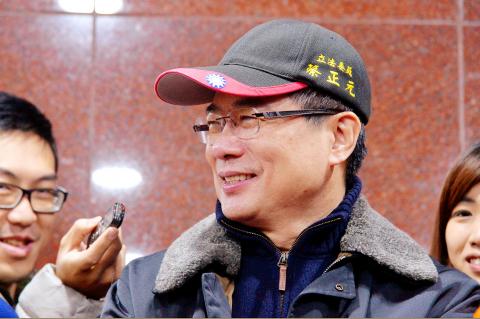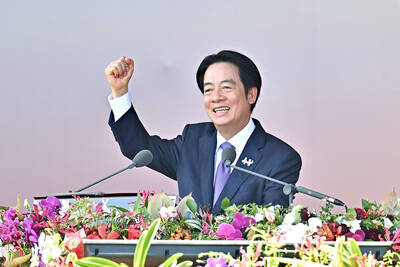Chinese Nationalist Party (KMT) Legislator Alex Tsai (蔡正元), who served as campaign director for KMT Taipei mayoral candidate Sean Lien (連勝文), sparked an uproar yesterday with his first public appearance since the Nov. 29 elections, saying that he knew it would take a “miracle” for Lien to win and that the top echelons of the KMT had asked the candidate to refrain from bashing Ting Hsin International Group (頂新國際集團).
Tsai posted an article on Facebook at about midnight on Tuesday — coinciding with the publication of the latest issue of the Chinese-language Next Magazine, where he also shared “insider” information.
On both platforms, Tsai said that he became Lien’s campaign director on Aug. 1 and — when visiting Legislative Speaker Wang Jin-pyng (王金平) on Aug. 7 — read an election analysis report provided by Wang after which he concluded: “Unless a miracle occurred, it would be impossible for Lien to win the election.”

Photo: CNA
He was “a warrior who had no right to choose his battlefield and could only charge forward without reservation,” Tsai wrote on Facebook.
He listed a dozen reasons Lien had failed. The primary reason was the “negative campaign of class struggle” by then-independent candidate Ko Wen-je’s (柯文哲), during which Lien’s rival “incited a large group of young people to ‘envy and hate’ Lien’s family background and wealth.”
Two major food scandals in a year and policy failures — such as a cut to the benefits received by retired military personnel, public school teachers and civil servants and the implementation of 12-year national education program — had “uprooted the chance of victory for Lien,” Tsai added.
He also called the political feud between President Ma Ying-jeou (馬英九) and Wang “stupid.”
“Wang’s report found the cause of the disease, but no medicine was prescribed,” Tsai said. “Good medicine tastes bitter. A drug that might have been effective was not acceptable to some.”
The “effective medicine” was apparently in reference to the castigation of Ting Hsin that Tsai had wanted Lien to undertake during the campaign.
Ting Hsin is the food manufacturing giant that triggered public anger earlier this fall for its involvement in repeated adulterated cooking oil scandals, prompting calls from netizens and civic groups for a boycott on the conglomerate’s goods and services.
Amid the then-snowballing cooking oil scandal surrounding the business group, the KMT filed a lawsuit against an individual who alleged that during his re-election campaign in 2012, Ma received a political donation of NT$1 billion (US$32.8 million at current exchange rates) from the Wei (魏) family, Ting Hsin’s owners.
According to the Next Magazine report, which cited Tsai, Lien blocked a plan characterized as “the extermination of Ting Hsin,” because KMT Central Standing Committee member Lee Te-wei (李德維) told him that KMT Deputy Secretary-General Lin Teh-jui (林德瑞) had called and asked Lien not to single out Ting Hsin when talking about food safety issues.
Tsai alleged that since Lin could not have made such a decision by himself, it was probably Ma or National Security Council Secretary-General King Pu-tsung (金溥聰), Ma’s confidant, who was pulling the strings, according to the magazine.
However, Tsai told reporters at the Legislative Yuan in Taipei yesterday — where he showed up for the Finance Committee meeting — that the magazine exaggerated his stance.
“I did not [name Ma or King]; I do not have proof for that,” he said, adding that it was the reporter who asked him whether it might have been the duo.
However, the legislator said that just days after Lin asked the team to suspend the plan to target Ting Hsin, “the Presidential Office itself fired away at the corporation.”
“I call Lien a lonely fighter who got abandoned on the battlefield,” Tsai said.
Later yesterday, KMT Culture and Communication Committee director Fan Chiang Tai-chi (范姜泰基) denied the report, saying that the party did not dictate how Lien responded to the cooking oil scandal involving Ting Hsin International Group.
According to Fan Chiang, Lin called Lee once to discuss the food safety issue, as Tsai said in the report, but the conversation was about Lin expressing his concerns about the impact of the food safety scandal on the election.
Lin said he made the call to Lee in his personal capacity, as opposed to being asked to do so by any upper-echelon officials, and what he said to Lee — which he said contained no mention of Ting Hsin — reflected only his personal views.
Lee also denied the report, saying that Lien’s campaign office had set its position on the issue before he got the telephone call from Lin.
The Presidential Office said that neither Ma nor King gave any directive to the party or Lien’s campaign office regarding the case.

The Ministry of the Interior (MOI) is to tighten rules for candidates running for public office, requiring them to declare that they do not hold a Chinese household registration or passport, and that they possess no other foreign citizenship. The requirement was set out in a draft amendment to the Enforcement Rules of the Public Officials Election and Recall Act (公職人員選舉罷免法 ) released by the ministry on Thursday. Under the proposal, candidates would need to make the declaration when submitting their registration forms, which would be published in the official election bulletin. The move follows the removal of several elected officials who were

FOUR DESIGNATED AREAS: Notices were issued for live-fire exercises in waters south and northwest of Penghu, northeast of Keelung and west of Kaohsiung, they said The military is planning three major annual exercises across the army, navy and air force this month, with the navy’s “Hai Chiang” (海強, “Sea Strong”) drills running from today through Thursday, the Ministry of National Defense said yesterday. The Hai Chiang exercise, which is to take place in waters surrounding Taiwan, would feature P-3C Orion maritime patrol aircraft and S-70C anti-submarine helicopters, the ministry said, adding that the drills aim to bolster the nation’s offshore defensive capabilities. China has intensified military and psychological pressure against Taiwan, repeatedly sending warplanes and vessels into areas near the nation’s air defense identification zone and across

SENATE RECOMMENDATION: The National Defense Authorization Act encourages the US secretary of defense to invite Taiwan’s navy to participate in the exercises in Hawaii The US Senate on Thursday last week passed the National Defense Authorization Act (NDAA) for Fiscal Year 2026, which strongly encourages the US secretary of defense to invite Taiwan’s naval forces to participate in the Rim of the Pacific (RIMPAC) exercise, as well as allocating military aid of US$1 billion for Taiwan. The bill, which authorizes appropriations for the military activities of the US Department of Defense, military construction and other purposes, passed with 77 votes in support and 20 against. While the NDAA authorizes about US$925 billion of defense spending, the Central News Agency yesterday reported that an aide of US

NATIONAL DAY: The ‘Taiwan Dome’ would form the centerpiece of new efforts to bolster air defense and be modeled after Israel’s ‘Iron Dome,’ sources said President William Lai (賴清德) yesterday pledged to strengthen the nation’s air defense capabilities and build a “T-Dome” system to create a safety net against growing military threats from China. “We will accelerate our building of the T-Dome, establish a rigorous air defense system in Taiwan with multi-layered defense, high-level detection and effective interception, and weave a safety net for Taiwan to protect the lives and property of citizens,” he said in his National Day address. In his keynote address marking the Republic of China’s (ROC) 114th anniversary, Lai said the lessons of World War II have taught nations worldwide “to ensure that